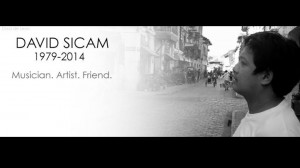MANILA, Philippines—It took a year for musician-artist Andrew David Sicam to plan his son’s birthday celebration. It took seconds for a bus crash to wipe it all away.
Sicam was among the 14 people who perished after the Florida Trans Bus that carried them fell into a 500-meter-deep ravine in Barangay Talubin in the capital Bontoc of Mountain Province on Friday.
One of the survivors, Charley Sta. Maria, told the Inquirer by phone on Friday that she, her boyfriend Paeng Gordovez and Arvin Jimenez, better known as the comedian “Tado,” were part of the group that had joined Sicam and his family to celebrate his son Amien’s fourth birthday.
Sta. Maria recalled that they were less than an hour away from their destination when the bus lost its brakes. The bus was not going very fast, she said, but the road was sloping downward.
“That’s why the bus’s speed was gaining momentum. Some of the passengers were telling the driver to just crash the bus before we went any faster. But he didn’t. We passed three curves before we went down the ravine,” she said.
She remembered folding her body into the fetal position and being tossed around in the air.
Seated in the fourth row from the back of the bus, Sta. Maria and Gordovez, a student trainee at the National Commission for Culture and Arts (NCCA), survived with minor wounds.
“David was right up front with his family. Tado was fast asleep behind us, two seats from the back,” she said.
Four people in their group died: Jimenez, Sicam, Gerard Baja and Don Marcial Bernard.
There were 15 of them—photographers, artists, musicians and filmmakers—who joined Sicam, his wife Abby and children Amien and Agung, 7.
The Sicam family was part of the group of artists that conceptualized the peace mural at Camp Aguinaldo—a four-kilometer long perimeter wall painted with symbols of peace.
Life in the mountains
“David thought that instead of celebrating Amien’s birthday at Jollibee, why not celebrate it with the Butbot tribe,” said Sta. Maria, an associate director at Gung Ho Films Manila. Sicam planned the outing for a year.
She said she and her friends had visited the Butbot community, home to the vanishing tribal body art of tattooing, a number of times.
“All of us also love the mountains,” Sta. Maria said.
Comedian Jimenez was also on a personal project called “40 Mountains Project,” which he posted on his Instagram account the day before the accident. Ironically, Jimenez wrote, “Life begins in the mountains.”
According to Dakila, a group creatively inspiring social transformation, “40 Mountains” was a series of travel-themed video projects the comedian had been working on and was “another one of his many advocacies for the environment.”
Jimenez cofounded Dakila in 2005 together with musician and television personality Lourd de Veyra, singer-composer Noel Cabangon, bassist Buwi Meneses and actor Ronnie Lazaro.
“He (Jimenez) was turning 40 in March and he intended to climb 40 mountains for his 40th year. Also, he was writing a travel book,” Sta. Maria said.
In a press statement, Dakila described Jimenez as “a true artist and a dedicated activist.”
“His thought-provoking lines, witty commentary and signature style commanded the attention and rebellion of the public that sought alternative heroes. His ideas, bordering on the insanely absurd to the downright brilliant, spawned outstanding work that continue to influence this generation,” the statement said.
De Veyra said Jimenez was more than a mere “comedian.”
Serious, deep thinker
“Behind that facade was a man of countless talents and deep sense of social commitment. He had a capacity for the profound, without losing an eye for the absurd,” De Veyra told the Inquirer in a text message.
Writer-director-producer Ian del Carmen, who worked with Jimenez on ABS-CBN’s now-defunct noontime variety show “MTB” in 2004, said Jimenez was like “a male version of Juana Change.”
“He was very serious and a deep thinker. He wanted to have a better society,” said Del Carmen.
“He was that rare person who could make you laugh at the smallest things, yet consider the bigger issues at the same time,” said filmmaker Quark Henares.
Filmmaker and TV director Sigfreid Barros Sanchez said Jimenez had a different comedic style.
“It was intelligent and didn’t conform to the norm,” Sanchez said. “That’s why he got less and less TV guestings. Mainstream media couldn’t quite tell if he was simply joking or preaching.”
Folk singer Bayang Barrios said she personally witnessed Jimenez’s passion for helping others during the first stop of the “Sandugo” concert series recently in Tacloban City for the benefit of “Yolanda” survivors.
“I saw how much he made the people happy by sharing whatever he had,” she said. “He managed to drive his point and ideas across without you even noticing because he made you laugh all the time.”
His death was as eerie as it was shocking. The day before he died, Jimenez posted on his Instagram account photos which—as many of his followers have pointed out—turned out to be rather foreboding.
On a photo showing Jimenez’s face being caked with makeup was a caption that said: “North o South… cemetery?”
Jimenez is survived by his wife Lei and daughters Taja, Diyosa, Indi and Tila.
On Saturday, Philippine Air Force helicopters airlifted seven survivors who were seriously injured in the accident, said Maj. Emmanuel Garcia, 1st Civil Relations Group commander of the Northern Luzon Command.
“All seven were recommended by doctors to be airlifted. All others will stay in the Bontoc General Hospital,” Garcia said.
RELATED STORIES
Tado Jimenez’s Instagram post: ‘North or South . . . cemetery’
Bus accident fatalities begin journey home
Comedian Tado Jimenez, 2 foreigners among 14 dead in Bontoc bus plunge
2 bus firms tagged in mishap suspended
